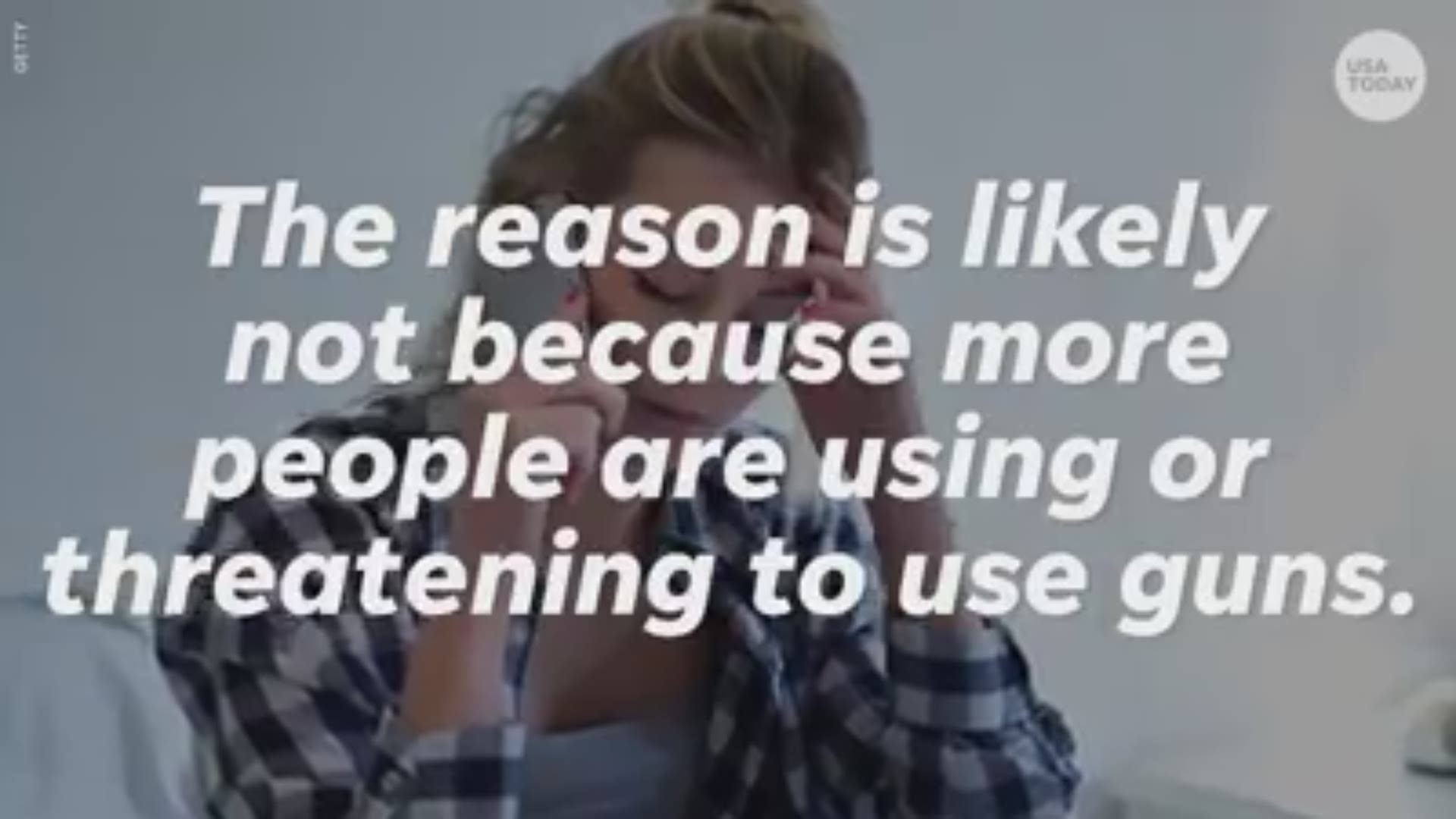Calls to the National Domestic Violence Hotline involving firearms were up more than 75% in 2017, according to an analysis out Monday by the hotline.
The surge, which followed a year that had a 50% increase in gun-related domestic violence reports, is attributed to increased publicity surrounding mass shootings.
Nearly 12,000 of the hotline's calls in 2017 were related to guns, up from about 6,800 such contacts in 2016.
"Many survivors feel like they are alone," Hotline CEO Katie Ray-Jones says. "When they hear stories in the media, they see reflections of themselves and want to chat."
Along with reporting threats to themselves and their children, women are "calling to say, 'My husband may be capable of a mass shooting,' " Ray-Jones says.
More than half of mass shootings in the USA from January 2009 to December 2016 were related to domestic or family violence, according to a report out last year from the advocacy group Everytown for Gun Safety.
The analysis showed an increase of more than 13% in calls from people with immigration and domestic violence problems. The calls picked up around the time President Trump began signing executive orders related to immigration early in his administration.

"It's mostly women reaching out in fear because of what they're seeing on TV," Ray-Jones says, citing news reports of women getting deported and separated from children. "Their abusers say, 'That’s going to be you. I’m going to get you deported, and you’re never going to see (your children) again.' They leverage that to keep her in the relationship."
Fear of deportation affects neighbors who would otherwise call the police when they hear or see abuse, Ray-Jones says. The phenomenon frustrates police, whose efforts to bolster relationships with the immigrant community are undermined, she says.
People can't be detained by immigration authorities while they are in court seeking protective orders. But in El Paso, Immigration and Customs Enforcement (ICE) agents detained a woman outside the courthouse after she got a protective order against her abusive partner.
Hotline advocate Paula Davis says she survived 13 years of physical and psychological abuse in a relationship with her children's father. She says what the undocumented victims face is worse.
"They have a whole other level of fear that they’re dealing with — the thought of going back where they came from (and) leaving children with someone who was mistreating them," Davis says. "As a parent, our first priority is our children."
When she started at the hotline as an AmeriCorps worker who was in addiction recovery, Davis had never heard the term "domestic violence." She's determined to help other women avoid what she went through.
"One of my missions is to use my voice as much as I can, so no one has to suffer in the silence that I did," Davis says.
In at least 54% of 85 shootings involving four or more people from January 2009 to December 2016, the perpetrator shot a current or former intimate partner or family member, according to the report by Everytown for Gun Safety. There were 422 people killed, 181 of them children. The risk of death for abused partners is five times greater if guns are present, says Everytown policy and legal director Elizabeth Avore. The group has worked on domestic violence and gun legislation in about two dozen states since 2013.
Some of the hotline's calls involved cases in which the abuser:
•Cleaned his gun while staring at his partner.
•Stockpiled trash bags and duct tape to evoke fear.
•Forced a woman and her child to stand outside while he got his gun.
Less than 10% of the hotline's calls come from men, although the Centers for Disease Control and Prevention (CDC) reports about one in seven men — compared with one in four women — have been abused by an intimate partner. The injuries women face tend to be more serious, Ray-Jones says, because of the typical difference in size and strength. Men are more reluctant to admit to being victims of abuse, Ray-Jones says.
Among the hotline report's other findings: A 12% increase in people reporting that children were involved in their abusive situations and a 14% uptick in abuse that involved stalking.
More than 98,000 calls went unanswered "due to a lack of resources."
Online resources and chat are available to those visiting the hotline's website, but visitors get a pop-up warning: "Computer use can be monitored and is impossible to completely clear." People concerned their Internet usage might be monitored can call the hotline at (800) 799−7233, or (800) 799-SAFE.

